Table of Contents
Chapter 5
Association POW Diplomacy Extends to Eastern and Southern Europe
1
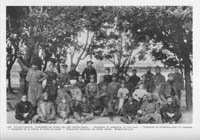 While Archibald Harte and Carlisle Hibbard conducted negotiations in the West, the World's Alliance of YMCAs had
already begun providing relief in the Austro-Hungarian Empire. Christian Phildius traveled to Vienna and began
negotiations with the Dual Monarchy government to establish relief work for soldiers as a pre-condition for
welfare work for POWs held by the Austro-Hungarians. More importantly, by May 1915, Harte faced a dilemma in
Germany. The German government recognized that the YMCA was providing important welfare relief for German
prisoners in Britain and France, and that Western Allied POWs received similar treatment in German prisons.
Because the Germans integrated the Allied POWs in their prisons, Russian and Serbian prisoners received welfare
benefits in German prisons that German prisoners did not yet receive in Russia and Serbia. To expand operations
in Germany, the YMCA had to gain access to Central Power prisoners held in Eastern Europe. Harte also recognized
that, for the Russians to accept American YMCA POW services, the Association would have to extend its operations
to Austria-Hungary, which held a large number of Russian prisoners. This intricate web of diplomacy was further
complicated by Italy's entry into the war in May 1915. Association services to POWs in Austria-Hungary would
include Italian prisoners, and the Dual Monarchy would demand reciprocity for Austro-Hungarian prisoners in Italy.
Bulgaria's entry into the war in October 1915, followed by Romania's war declaration in August 1916, compounded
the terrible conditions prisoners faced. To expand operations and meet the needs of war prisoners, Association
secretaries would have to persuade the Russian, Austro-Hungarian, Serbian, Italian, Bulgarian, and Romanian
governments to accept YMCA services.
While Archibald Harte and Carlisle Hibbard conducted negotiations in the West, the World's Alliance of YMCAs had
already begun providing relief in the Austro-Hungarian Empire. Christian Phildius traveled to Vienna and began
negotiations with the Dual Monarchy government to establish relief work for soldiers as a pre-condition for
welfare work for POWs held by the Austro-Hungarians. More importantly, by May 1915, Harte faced a dilemma in
Germany. The German government recognized that the YMCA was providing important welfare relief for German
prisoners in Britain and France, and that Western Allied POWs received similar treatment in German prisons.
Because the Germans integrated the Allied POWs in their prisons, Russian and Serbian prisoners received welfare
benefits in German prisons that German prisoners did not yet receive in Russia and Serbia. To expand operations
in Germany, the YMCA had to gain access to Central Power prisoners held in Eastern Europe. Harte also recognized
that, for the Russians to accept American YMCA POW services, the Association would have to extend its operations
to Austria-Hungary, which held a large number of Russian prisoners. This intricate web of diplomacy was further
complicated by Italy's entry into the war in May 1915. Association services to POWs in Austria-Hungary would
include Italian prisoners, and the Dual Monarchy would demand reciprocity for Austro-Hungarian prisoners in Italy.
Bulgaria's entry into the war in October 1915, followed by Romania's war declaration in August 1916, compounded
the terrible conditions prisoners faced. To expand operations and meet the needs of war prisoners, Association
secretaries would have to persuade the Russian, Austro-Hungarian, Serbian, Italian, Bulgarian, and Romanian
governments to accept YMCA services.
Austro-Hungarian YMCA War Work Service
2
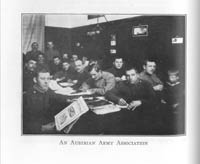 When the Habsburg government declared war against Serbia on 28 July 1914, the Austro-Hungarian YMCA sprang
into action to meet the wartime emergency. The National Union of Austro-Hungarian Associations was successful
in supporting the war effort. At the beginning of the war, the National YMCA was severely limited in both
membership and financial resources. Its initial goal was restricted to assisting Protestant soldiers and recently
drafted students. With the financial support of the American YMCA and the personnel assistance of the World's
Alliance, the National Union expanded their operations across the empire by providing services to soldiers in
major military camps and ministering to sick and wounded soldiers. Starting with one Soldatenheim in October
1914, the National Union established Soldiers' Homes in eleven Austrian cities and twelve Hungarian cities by
October 1916, establishing a truly national and ecumenical work. Secretaries proved that they could offer
entertainment, mental diversions, and religious comforts to soldiers from all parts of the Austro-Hungarian
Empire, and to both Protestant and Catholic troops. The National Union helped to set up a social welfare system
for the Austro-Hungarian military, which the imperial government lacked the resources and expertise to
establish.1
When the Habsburg government declared war against Serbia on 28 July 1914, the Austro-Hungarian YMCA sprang
into action to meet the wartime emergency. The National Union of Austro-Hungarian Associations was successful
in supporting the war effort. At the beginning of the war, the National YMCA was severely limited in both
membership and financial resources. Its initial goal was restricted to assisting Protestant soldiers and recently
drafted students. With the financial support of the American YMCA and the personnel assistance of the World's
Alliance, the National Union expanded their operations across the empire by providing services to soldiers in
major military camps and ministering to sick and wounded soldiers. Starting with one Soldatenheim in October
1914, the National Union established Soldiers' Homes in eleven Austrian cities and twelve Hungarian cities by
October 1916, establishing a truly national and ecumenical work. Secretaries proved that they could offer
entertainment, mental diversions, and religious comforts to soldiers from all parts of the Austro-Hungarian
Empire, and to both Protestant and Catholic troops. The National Union helped to set up a social welfare system
for the Austro-Hungarian military, which the imperial government lacked the resources and expertise to
establish.1
3
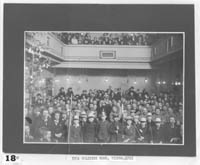 The National Union faced serious obstacles that hindered its effectiveness. Austro-Hungarian secretaries were
not permitted to administer relief to soldiers at the front-work had to be undertaken through correspondence
or in the rear areas. Secretaries also had to communicate with soldiers that spoke twelve different languages,
which limited the programs they could offer. These restrictions further complicated the delivery of YMCA
relief services. The government never provided the YMCA with postage franking privileges, which greatly
increased Association costs. The American, British, French, Russian, Italian, and German governments extended
this privilege to Associations operating within their borders. The National Union in the Habsburg Empire
simply lacked the resources to expand its operations. While the National Association did receive some gifts
from wealthy subjects, it relied heavily on foreign aid from the U.S. and Switzerland. The Austro-Hungarian
economy was shattered by the war, and this had a terrible impact on the subjects of the empire. The Association's
limitations may have been due to the underdeveloped status of the Austro-Hungarian YMCA before the war broke out,
which prevented it from taking a more active role in the war effort. It is also possible that its Protestant
origins made it generally suspect to the Catholic Dual Monarchy military authorities. There are many reports of
Catholic distrust of the YMCA's intentions. The Roman Catholic clergy looked on this social work with suspicion,
and occasionally instructed Catholic troops not to visit the Vienna Soldatenheim. One countess spent a
considerable amount of time trying to catch Association secretaries attempting to proselytize soldiers. Despite
her efforts, she could not obtain any proof, and learned that secretaries were simply trying "to do good and
bring each man in his own religion to the highest possible development." Even the Bishop of Vienna investigated
the Association headquarters to find out the true nature of YMCA work and determine whether the secretaries were
involved in sectarian propaganda. After listening to a thirty-minute presentation, he declared, "God bless you
and your work. The good you are doing is the best preparation for peace."2
The National Union faced serious obstacles that hindered its effectiveness. Austro-Hungarian secretaries were
not permitted to administer relief to soldiers at the front-work had to be undertaken through correspondence
or in the rear areas. Secretaries also had to communicate with soldiers that spoke twelve different languages,
which limited the programs they could offer. These restrictions further complicated the delivery of YMCA
relief services. The government never provided the YMCA with postage franking privileges, which greatly
increased Association costs. The American, British, French, Russian, Italian, and German governments extended
this privilege to Associations operating within their borders. The National Union in the Habsburg Empire
simply lacked the resources to expand its operations. While the National Association did receive some gifts
from wealthy subjects, it relied heavily on foreign aid from the U.S. and Switzerland. The Austro-Hungarian
economy was shattered by the war, and this had a terrible impact on the subjects of the empire. The Association's
limitations may have been due to the underdeveloped status of the Austro-Hungarian YMCA before the war broke out,
which prevented it from taking a more active role in the war effort. It is also possible that its Protestant
origins made it generally suspect to the Catholic Dual Monarchy military authorities. There are many reports of
Catholic distrust of the YMCA's intentions. The Roman Catholic clergy looked on this social work with suspicion,
and occasionally instructed Catholic troops not to visit the Vienna Soldatenheim. One countess spent a
considerable amount of time trying to catch Association secretaries attempting to proselytize soldiers. Despite
her efforts, she could not obtain any proof, and learned that secretaries were simply trying "to do good and
bring each man in his own religion to the highest possible development." Even the Bishop of Vienna investigated
the Association headquarters to find out the true nature of YMCA work and determine whether the secretaries were
involved in sectarian propaganda. After listening to a thirty-minute presentation, he declared, "God bless you
and your work. The good you are doing is the best preparation for peace."2
World's Alliance POW Diplomacy in the Dual Monarchy
4
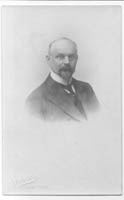 When the war began, Christian Phildius started efforts in the Austrian Association to extend YMCA work to
POWs in the Dual Monarchy. At first, Austro-Hungarian military authorities did not permit personal work
among Russian and Serbian prisoners. The only service they did allow was the distribution of religious
literature through Austro-Hungarian Red Cross channels. Unfortunately, the National Alliance had only a
limited supply of Holy Scriptures in Russian and Serbian but they augmented their supplies the help of
the British and Foreign Bible Society and a Swiss donor. By March 1915, over two hundred thousand Russian and Serbian
POW's were held in the Dual Monarchy and many were eager to get their hands on anything they could read.
Secretaries considered this a unique opportunity to place copies of the Gospel into the hands of men who
now had the time to read, study, and meditate. Phildius wrote to the International Committee in New York,
"Should we not use this God-given opportunity without delay, as most of these poor men may never have read
the Gospel story in their own language and, when once returned to their country, may never hear it again."
By April 1915, the Austrian YMCA distributed Gospels to twenty-seven thousand Russian and Serbian POWs through the
Austro-Hungarian Red Cross. Phildius made contacts with other Bible societies, including the American Bible
Society and British and Foreign Bible Society, to ensure continued deliveries of Gospels to war prisoners,
but lamented that this was the only welfare service the Austro-Hungarian Association could offer. He hoped
to persuade the imperial authorities to let the YMCA extend regular services to POWs to help ease their
suffering.3
When the war began, Christian Phildius started efforts in the Austrian Association to extend YMCA work to
POWs in the Dual Monarchy. At first, Austro-Hungarian military authorities did not permit personal work
among Russian and Serbian prisoners. The only service they did allow was the distribution of religious
literature through Austro-Hungarian Red Cross channels. Unfortunately, the National Alliance had only a
limited supply of Holy Scriptures in Russian and Serbian but they augmented their supplies the help of
the British and Foreign Bible Society and a Swiss donor. By March 1915, over two hundred thousand Russian and Serbian
POW's were held in the Dual Monarchy and many were eager to get their hands on anything they could read.
Secretaries considered this a unique opportunity to place copies of the Gospel into the hands of men who
now had the time to read, study, and meditate. Phildius wrote to the International Committee in New York,
"Should we not use this God-given opportunity without delay, as most of these poor men may never have read
the Gospel story in their own language and, when once returned to their country, may never hear it again."
By April 1915, the Austrian YMCA distributed Gospels to twenty-seven thousand Russian and Serbian POWs through the
Austro-Hungarian Red Cross. Phildius made contacts with other Bible societies, including the American Bible
Society and British and Foreign Bible Society, to ensure continued deliveries of Gospels to war prisoners,
but lamented that this was the only welfare service the Austro-Hungarian Association could offer. He hoped
to persuade the imperial authorities to let the YMCA extend regular services to POWs to help ease their
suffering.3
5
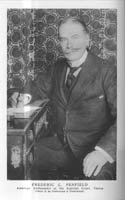 In the Dual Monarchy, Phildius gained some support from the Austro-Hungarian government. With the aid of
Frederic C. Penfield, the U.S. Ambassador to Austria-Hungary, Phildius persuaded the Austro-Hungarian War
Office to permit Austrian secretaries to begin services at two prison camps. The German government had
decided to permit American secretaries to begin work in prison camps in Germany, and the Austro-Hungarians
were impressed with the American service. The Minister of War instructed Lieutenant Field Marshal Urban to
inform Ambassador Penfield on 27 May 1915:
In the Dual Monarchy, Phildius gained some support from the Austro-Hungarian government. With the aid of
Frederic C. Penfield, the U.S. Ambassador to Austria-Hungary, Phildius persuaded the Austro-Hungarian War
Office to permit Austrian secretaries to begin services at two prison camps. The German government had
decided to permit American secretaries to begin work in prison camps in Germany, and the Austro-Hungarians
were impressed with the American service. The Minister of War instructed Lieutenant Field Marshal Urban to
inform Ambassador Penfield on 27 May 1915:
…that it will grant the Young Men's Christian Association permission for the present to carry on its work of humanity in one prisoners' camp each in Austria and in Hungary. Whether an extension of the charitable activities of the World's Union [World's Alliance] to other prisoners' camps can be given consideration will depend upon the results attained and upon the analogous action on the part of the Imperial Russian and Royal Serbian governments.
The imperial government selected Braunau-in-Böhmen in Bohemia and Sopronnyek in Hungary, each with thirty thousand Russian POWs, as the first sites for Association work. Under this permit, the Ministry of War granted the YMCA permission to construct a hut and assign one secretary in each camp.4
6
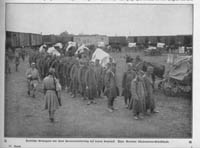 The Austro-Hungarian government was impressed with the results the American YMCA had achieved in Germany, and
saw potential benefit for Dual Monarchy prisoners in Allied war prisons. When the government granted the
Association permission to begin work in Austria-Hungary in May 1915, Sir Alarad von Szilassy indicated it
could be expanded to other POW camps, including Brünn in Moravia, Prague in Bohemia, Kenyermezö in
Hungary, and Spratzern and Wieselburg in Lower Austria by the end of the year. The key to greater access to
Austro-Hungarian prisons lay in "reciprocity diplomacy." Viennese officials insisted that their nationals
languishing in Russian and Serbian prison camps must also receive YMCA POW services.5
The Austro-Hungarian government was impressed with the results the American YMCA had achieved in Germany, and
saw potential benefit for Dual Monarchy prisoners in Allied war prisons. When the government granted the
Association permission to begin work in Austria-Hungary in May 1915, Sir Alarad von Szilassy indicated it
could be expanded to other POW camps, including Brünn in Moravia, Prague in Bohemia, Kenyermezö in
Hungary, and Spratzern and Wieselburg in Lower Austria by the end of the year. The key to greater access to
Austro-Hungarian prisons lay in "reciprocity diplomacy." Viennese officials insisted that their nationals
languishing in Russian and Serbian prison camps must also receive YMCA POW services.5
Harte and Reciprocity with Russia
7
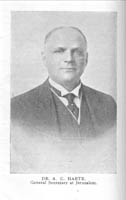 Although Harte and Hibbard had focused their attention on gaining access to prison camps in Western Europe,
by early May 1915 Harte had concluded that further expansion in Germany was impossible without reciprocal
access to German POWs in Russia. The American secretary received requests for Association work and YMCA huts
from many camps, and the WPA committee proposed several new projects. The German Ministry of War was unwilling
to authorize any expansion in services without similar relief for German POWs, especially in Russia. Many
Germans were concerned about the welfare of their countrymen in the East, especially as reports spread about
the inhumane conditions in the Siberian camps. U.S. Ambassador James W. Gerard strongly supported the extension
of American Red Triangle services to the Tsar's domain, and Harte agreed that successful access to Russian
prisons would give the Association a freer hand in Germany. As a result, Harte prepared for a trip to Petrograd
to meet with Russian authorities about opening Eastern prison camps to the American YMCA.6
Although Harte and Hibbard had focused their attention on gaining access to prison camps in Western Europe,
by early May 1915 Harte had concluded that further expansion in Germany was impossible without reciprocal
access to German POWs in Russia. The American secretary received requests for Association work and YMCA huts
from many camps, and the WPA committee proposed several new projects. The German Ministry of War was unwilling
to authorize any expansion in services without similar relief for German POWs, especially in Russia. Many
Germans were concerned about the welfare of their countrymen in the East, especially as reports spread about
the inhumane conditions in the Siberian camps. U.S. Ambassador James W. Gerard strongly supported the extension
of American Red Triangle services to the Tsar's domain, and Harte agreed that successful access to Russian
prisons would give the Association a freer hand in Germany. As a result, Harte prepared for a trip to Petrograd
to meet with Russian authorities about opening Eastern prison camps to the American YMCA.6
8
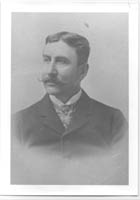 Harte departed for Petrograd on 18 May 1915. Before the war, the American YMCA had focused on developing an
Association movement in Russia as part of Mott's plan to expand into the Orthodox world. Through the financial
generosity of James Stokes, a wealthy American philanthropist who in 1886 supported the establishment of the
YMCA in Paris, the Association began its nascent work in Russia. The Russian Association movement began
in St. Petersburg in 1900, and was known as the Miyak (Lighthouse). Work in the Russian Empire grew
slowly, so that, by July 1914, the Miyak had made only minimal gains. In addition to the Petrograd
Association, the Russian YMCA was building a facility in Moscow and had permission to start a third
organization in Kiev. Two major obstacles hindered YMCA growth in the Tsarist empire. First, Russia was
intensely Orthodox and, ever fearful of proselytizing, they were suspicious of Protestant welfare agencies
operating within their borders. Second, the Russians tended towards xenophobia, and they remained on guard
against any foreign organizations. This xenophobia was further fanned by Pan-Slavic nationalism, which erupted
across the country in response to the war against the Central Powers.7
Harte departed for Petrograd on 18 May 1915. Before the war, the American YMCA had focused on developing an
Association movement in Russia as part of Mott's plan to expand into the Orthodox world. Through the financial
generosity of James Stokes, a wealthy American philanthropist who in 1886 supported the establishment of the
YMCA in Paris, the Association began its nascent work in Russia. The Russian Association movement began
in St. Petersburg in 1900, and was known as the Miyak (Lighthouse). Work in the Russian Empire grew
slowly, so that, by July 1914, the Miyak had made only minimal gains. In addition to the Petrograd
Association, the Russian YMCA was building a facility in Moscow and had permission to start a third
organization in Kiev. Two major obstacles hindered YMCA growth in the Tsarist empire. First, Russia was
intensely Orthodox and, ever fearful of proselytizing, they were suspicious of Protestant welfare agencies
operating within their borders. Second, the Russians tended towards xenophobia, and they remained on guard
against any foreign organizations. This xenophobia was further fanned by Pan-Slavic nationalism, which erupted
across the country in response to the war against the Central Powers.7
9
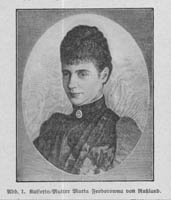 Despite these tensions, Harte pressed ahead with his mission. For two weeks, the American secretary met with
leading Russian dignitaries, including the Procurator of the Holy Synod, Dowager Empress Marie Feodorovna,
General Beliaeff (Chief of the General Staff), and numerous Foreign Ministry officials.
Despite these tensions, Harte pressed ahead with his mission. For two weeks, the American secretary met with
leading Russian dignitaries, including the Procurator of the Holy Synod, Dowager Empress Marie Feodorovna,
General Beliaeff (Chief of the General Staff), and numerous Foreign Ministry officials.
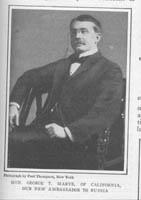 The U.S. Ambassador to Petrograd, George Thomas Marye, supported the YMCA representative. The American
embassy in Petrograd was overwhelmed by German and Austro-Hungarian POW work, which represented eighty
percent of the staff's total activity. Harte was armed with photographs, motion pictures, and reports
regarding the treatment of Russian POWs in Germany and the Association's efforts in improving their condition.
When Harte finally gained an audience with Tsarina Alexandra, she was impressed with his presentation.
The U.S. Ambassador to Petrograd, George Thomas Marye, supported the YMCA representative. The American
embassy in Petrograd was overwhelmed by German and Austro-Hungarian POW work, which represented eighty
percent of the staff's total activity. Harte was armed with photographs, motion pictures, and reports
regarding the treatment of Russian POWs in Germany and the Association's efforts in improving their condition.
When Harte finally gained an audience with Tsarina Alexandra, she was impressed with his presentation.
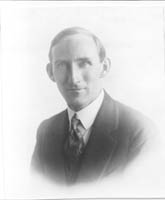 In early June 1915, Harte and George M. Day, an American YMCA secretary working with the Miyak, received
official permission to visit prison camps in Siberia. During this trip, Harte practiced the same tactics he
had used to secure the confidence of German Ministry of War officials. Conditions in Russia and Siberia were
as bad as reported by the German press.
In early June 1915, Harte and George M. Day, an American YMCA secretary working with the Miyak, received
official permission to visit prison camps in Siberia. During this trip, Harte practiced the same tactics he
had used to secure the confidence of German Ministry of War officials. Conditions in Russia and Siberia were
as bad as reported by the German press.
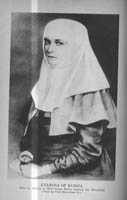 The Russians had a difficult time containing epidemics, especially typhus. The mail service was inadequate
and prevented POWs from communicating with their families. In addition, the imperial bureaucracy was
overwhelmed by the POW problem. The Russians could not even maintain statistics. Despite these problems,
the secretary filed favorable and sympathetic reports about the conditions he found in Siberian prison camps
with the U.S. embassy and the Russian government, stressing optimism about future Association work for
POWs.8
The Russians had a difficult time containing epidemics, especially typhus. The mail service was inadequate
and prevented POWs from communicating with their families. In addition, the imperial bureaucracy was
overwhelmed by the POW problem. The Russians could not even maintain statistics. Despite these problems,
the secretary filed favorable and sympathetic reports about the conditions he found in Siberian prison camps
with the U.S. embassy and the Russian government, stressing optimism about future Association work for
POWs.8
10 The combination of Harte's court contacts, official American support, the Russian need for assistance in providing for Central Power POWs, the concern for Russian prisoners in German camps, and Harte's constructive reports on Siberian conditions resulted in Tsarist approval of the YMCA proposals. On June 14, General Vladimir Sukhomlinov, the Russian Ministry of War, invited the two American secretaries to begin work immediately, with others to be added later. In response to Harte's success, the International Committee cabled $25,000 on July 12 to finance these operations in Russia.9
11 Harte returned to Berlin by late July 1915 to report his diplomatic successes in Petrograd and his Siberian inspection trip to German officials. The Ministry of War was delighted that the Russians had accepted the American YMCA's proposals, which would help improve conditions for German POWs in Siberia. After the meeting, Harte was convinced that German authorities would allow greater latitude for American YMCA operations in Germany. By July 27, the Ministry of War had granted Harte permission to visit all prison camps in Prussia, to establish Association huts, to distribute money and parcels sent in his care personally, to employ two German-American assistants, and to set up libraries, orchestras, and other services-"provided that similar work is done in Russia." In response, Harte cabled Petrograd that he could receive, duty-free and post-free, fifty thousand parcels for Russian POWs in Germany and supervise their distribution. The American secretary planned a meeting in Stockholm between representatives of the German and Russian Ministries of War and himself to arrange Association work between the two empires. He also decided to cram in as much work as possible in Germany over the next six weeks before taking a second trip to Russia, before the cold weather arrived. By mid-September, the importance of Harte's "shuttle diplomacy" was acknowledged by the International Committee when he was appointed International General Secretary in Europe, beginning October 1. Harte was now responsible for promoting and expanding WPA operations in Germany, Austria-Hungary, and Russia.10
12
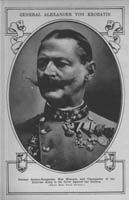 In Austria-Hungary, Phildius lacked the resources and contacts to undertake such diplomacy, but American
YMCA representatives were already in the field. Harte's successful trip to Russia in the late spring of
1915 impressed authorities in Vienna. Phildius met with Harte in Berlin in early July to find out what
the American had achieved in Russia for German POWs. Phildius was convinced that reciprocity between
Petrograd and Vienna was the only way to guarantee YMCA access to POWs in Austria-Hungary, and he urged
Harte to work through the U.S. Embassy in Russia. The Austro-Hungarian government wanted to negotiate
with the American YMCA in August 1915. The Ministry of War telephoned its counterparts in Berlin to invite
Harte to a conference in Vienna to discuss POW conditions in Siberia. The American Senior Secretary arrived
in the capital before his second trip to Russia to report to General Alexander von Krobatin, the Austrian
Ministry of War, on his progress in Russia. The minister acknowledged the value of the American YMCA's work
and provided one hundred thousand Marks so that Harte could begin social welfare work for Austro-Hungarian POWs in Russia.
The Minister of War also decided to allow American secretaries into the Habsburg Empire to conduct Association
POW services for Russian POWs. Harte agreed that the International Committee would finance two YMCA huts in
Braunau-in-Böhmen and Sopronnyek. Most importantly, Dual Monarchy officials permitted four American
secretaries to begin operations immediately.11
In Austria-Hungary, Phildius lacked the resources and contacts to undertake such diplomacy, but American
YMCA representatives were already in the field. Harte's successful trip to Russia in the late spring of
1915 impressed authorities in Vienna. Phildius met with Harte in Berlin in early July to find out what
the American had achieved in Russia for German POWs. Phildius was convinced that reciprocity between
Petrograd and Vienna was the only way to guarantee YMCA access to POWs in Austria-Hungary, and he urged
Harte to work through the U.S. Embassy in Russia. The Austro-Hungarian government wanted to negotiate
with the American YMCA in August 1915. The Ministry of War telephoned its counterparts in Berlin to invite
Harte to a conference in Vienna to discuss POW conditions in Siberia. The American Senior Secretary arrived
in the capital before his second trip to Russia to report to General Alexander von Krobatin, the Austrian
Ministry of War, on his progress in Russia. The minister acknowledged the value of the American YMCA's work
and provided one hundred thousand Marks so that Harte could begin social welfare work for Austro-Hungarian POWs in Russia.
The Minister of War also decided to allow American secretaries into the Habsburg Empire to conduct Association
POW services for Russian POWs. Harte agreed that the International Committee would finance two YMCA huts in
Braunau-in-Böhmen and Sopronnyek. Most importantly, Dual Monarchy officials permitted four American
secretaries to begin operations immediately.11
13
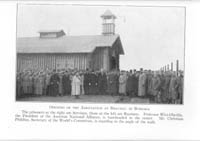 To finance the construction of the YMCA huts in Austria-Hungary, James Stokes, a long-time supporter of
Association overseas activities, donated $2,000. Stokes was deeply concerned about the spiritual welfare of
Russians given his long term interest in and support of the Miyak (Russian YMCA). On 19 December 1915,
the "James Stokes Pavilion" was officially inaugurated in Braunau-in-Böhmen with great fanfare. The
American and Spanish ambassadors, representatives of the Austrian and Danish Red Crosses, the President of the
Austrian YMCA Alliance, and members of the Austro-Hungarian Ministry of War attended the ceremony. The reason
for the six-month delay between official permission to open the hut and the inauguration ceremony was the lack
of skilled artisans among the POWs, who provided the bulk of the labor for the construction; the Austro-Hungarian
government had detailed a large number of prisoners out to farms for agricultural duties to bring in the harvest
of 1915.12
To finance the construction of the YMCA huts in Austria-Hungary, James Stokes, a long-time supporter of
Association overseas activities, donated $2,000. Stokes was deeply concerned about the spiritual welfare of
Russians given his long term interest in and support of the Miyak (Russian YMCA). On 19 December 1915,
the "James Stokes Pavilion" was officially inaugurated in Braunau-in-Böhmen with great fanfare. The
American and Spanish ambassadors, representatives of the Austrian and Danish Red Crosses, the President of the
Austrian YMCA Alliance, and members of the Austro-Hungarian Ministry of War attended the ceremony. The reason
for the six-month delay between official permission to open the hut and the inauguration ceremony was the lack
of skilled artisans among the POWs, who provided the bulk of the labor for the construction; the Austro-Hungarian
government had detailed a large number of prisoners out to farms for agricultural duties to bring in the harvest
of 1915.12
14
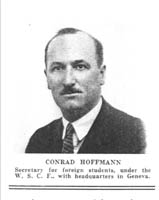 As a result of Harte and Hibbard's successful diplomacy in Europe, the International Committee dispatched
the "Flying Squadron" from New York on 3 July 1915. Eleven American YMCA secretaries volunteered to conduct
impartial war relief work for both sides for a two-month tour. The group arrived in Liverpool and awaited
assignment to either English POW camps or British soldiers. Problems soon hindered operations. The British
War Office, suspicious of pro-German sympathies among neutrals, pointed out to the English National YMCA
Council that one member of the Flying Squadron was of German origin and two others had German surnames. To
avoid potential conflicts, the International Committee assigned Conrad Hoffman to serve as the new Senior
Secretary in Germany in August 1915. This assignment would last for the duration of the war. Before
volunteering for service in Europe, Hoffman was a Student Secretary at the University of Kansas. He accepted
the position to gain additional Association experience, as well as the challenge of opening a new field. With
the support of the U.S. embassy in London, Hoffman obtained the necessary official papers and steamer tickets
to travel to Germany via the Netherlands.13
As a result of Harte and Hibbard's successful diplomacy in Europe, the International Committee dispatched
the "Flying Squadron" from New York on 3 July 1915. Eleven American YMCA secretaries volunteered to conduct
impartial war relief work for both sides for a two-month tour. The group arrived in Liverpool and awaited
assignment to either English POW camps or British soldiers. Problems soon hindered operations. The British
War Office, suspicious of pro-German sympathies among neutrals, pointed out to the English National YMCA
Council that one member of the Flying Squadron was of German origin and two others had German surnames. To
avoid potential conflicts, the International Committee assigned Conrad Hoffman to serve as the new Senior
Secretary in Germany in August 1915. This assignment would last for the duration of the war. Before
volunteering for service in Europe, Hoffman was a Student Secretary at the University of Kansas. He accepted
the position to gain additional Association experience, as well as the challenge of opening a new field. With
the support of the U.S. embassy in London, Hoffman obtained the necessary official papers and steamer tickets
to travel to Germany via the Netherlands.13
Harte Conducts a Second Trip to Russia
15
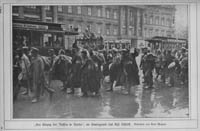 On August 21, Hoffman and Harte met to plan out a strategy for developing WPA services in Germany. By
mid-summer, the Germans had captured a large number of Russian war prisoners during the offensive into Poland.
The Germans and Austro-Hungarians had launched their attack on the Donajetz Line in late April 1915 and drove
into Galicia. They regained Przemsyl and Lemberg and crossed the Dniester River. The Central Powers occupied
all of Galicia and Bukovina by the end of June. In early July, the Teutonic allies launched a second offensive
on the Eastern Front. Dual Monarchy forces seized Lublin, Cholm, and Ivangorod in Russian Poland by August,
while the Germans drove into northern Poland and Courland, capturing Mitau, Warsaw, Brest-Litovsk, Grodno, and
Vilna by September. The need for American YMCA services in Germany had greatly increased. Hoffman took over
the WPA office in Berlin and made it a clearinghouse for information on German POWs in Russia. Hoffman requested
information about German POWs from Association secretaries in Paris, London, and Petrograd, and provided data
on Allied prisoners in Germany. The work mounted exponentially:
On August 21, Hoffman and Harte met to plan out a strategy for developing WPA services in Germany. By
mid-summer, the Germans had captured a large number of Russian war prisoners during the offensive into Poland.
The Germans and Austro-Hungarians had launched their attack on the Donajetz Line in late April 1915 and drove
into Galicia. They regained Przemsyl and Lemberg and crossed the Dniester River. The Central Powers occupied
all of Galicia and Bukovina by the end of June. In early July, the Teutonic allies launched a second offensive
on the Eastern Front. Dual Monarchy forces seized Lublin, Cholm, and Ivangorod in Russian Poland by August,
while the Germans drove into northern Poland and Courland, capturing Mitau, Warsaw, Brest-Litovsk, Grodno, and
Vilna by September. The need for American YMCA services in Germany had greatly increased. Hoffman took over
the WPA office in Berlin and made it a clearinghouse for information on German POWs in Russia. Hoffman requested
information about German POWs from Association secretaries in Paris, London, and Petrograd, and provided data
on Allied prisoners in Germany. The work mounted exponentially:
These are busier days than ever. I am on the go from 7:00 AM to 11:30 and 12:00 PM every day, going at break-neck speed and with the feverish haste to keep up with the demands made upon us. Innumerable personal interviews, hundreds of letters of inquiry that require answering, purchase of supplies and their shipment to the camps for the prisoners here in Germany, official visits and conferences-these keep us busy and help to make the days altogether too short for us. This past week has been awful from the standpoint of work and nervous strain.14
16
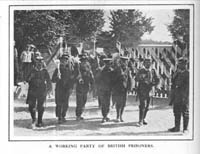 As the primary information contact for German POWs in Russia, Hoffman met continuously with family members
seeking information about missing soldiers or imprisoned loved ones. For many, the YMCA was their last hope.
Many family members provided money for transmission to Russia in the event a loved one was found. Harte arranged
to have his pictures of German POWs in Russia published by the local press. A wife unexpectedly identified
her husband, and a sister found her brother in the photographs. In addition to providing crucial aid to
families in wartime, Hoffman believed this work would help establish Christian Internationalism.15
As the primary information contact for German POWs in Russia, Hoffman met continuously with family members
seeking information about missing soldiers or imprisoned loved ones. For many, the YMCA was their last hope.
Many family members provided money for transmission to Russia in the event a loved one was found. Harte arranged
to have his pictures of German POWs in Russia published by the local press. A wife unexpectedly identified
her husband, and a sister found her brother in the photographs. In addition to providing crucial aid to
families in wartime, Hoffman believed this work would help establish Christian Internationalism.15
17
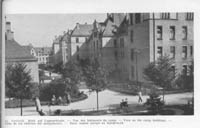 Hoffman contacted the International Committee in New York and determined that he would need at least five
experienced secretaries. He sought two good men to work with Russian POWs to begin operations at Worms, the
XIV Army Corps (Carlsruhe), and the XVIII Army Corps (Frankfurt-am-Main) in western Germany as well as at
Altdamm, Stargard, Czersk, Danzig, Tuchel, and Bütow, in eastern Germany, plus Parchim, Güstrow, and
Frankfurt-an-der-Oder in central Germany.
Hoffman contacted the International Committee in New York and determined that he would need at least five
experienced secretaries. He sought two good men to work with Russian POWs to begin operations at Worms, the
XIV Army Corps (Carlsruhe), and the XVIII Army Corps (Frankfurt-am-Main) in western Germany as well as at
Altdamm, Stargard, Czersk, Danzig, Tuchel, and Bütow, in eastern Germany, plus Parchim, Güstrow, and
Frankfurt-an-der-Oder in central Germany.
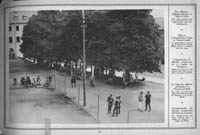 These camps each held between ten thousand and sixty thousand POWs. Association secretaries would be able to reach a
large number of men. Hoffman also wanted an experienced Red Triangle worker to begin relief operations with
French prisoners. While Indian POWs were certainly in need of YMCA assistance, they were too few in number
to justify a secretary working solely for their welfare.
These camps each held between ten thousand and sixty thousand POWs. Association secretaries would be able to reach a
large number of men. Hoffman also wanted an experienced Red Triangle worker to begin relief operations with
French prisoners. While Indian POWs were certainly in need of YMCA assistance, they were too few in number
to justify a secretary working solely for their welfare.
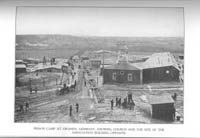 One area that did need immediate attention was relief operations for working parties. During the summer of
1915, the Germans began to increase the number of POWs they sent out of main prison camps on work details,
and Hoffman needed a secretary to look after the needs of these men. He also requested an office manager to
supervise operations at the WPA Office. He had one proviso; he did not want any preachers unless they had
Association training.16
One area that did need immediate attention was relief operations for working parties. During the summer of
1915, the Germans began to increase the number of POWs they sent out of main prison camps on work details,
and Hoffman needed a secretary to look after the needs of these men. He also requested an office manager to
supervise operations at the WPA Office. He had one proviso; he did not want any preachers unless they had
Association training.16
18
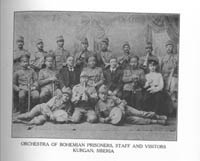 In preparation for the International General Secretary's second trip to Russia, Harte and Hoffman toured
German prison camps during August 1915. They visited the officers' camp at Crefeld, the Allied officers'
camp at the old fort in Mainz-Castell (primarily British officers, but holding some French and Russian officers
as well), and the military hospital in Wiesbaden. They also revisited the prison camp at Crossen-an-der-Oder.
Harte described an idyllic prison camp that featured a well-equipped hospital, kitchen, bakery, bank, post office,
shoemaker's shop, arts and crafts shops, athletic field, and gardens.
In preparation for the International General Secretary's second trip to Russia, Harte and Hoffman toured
German prison camps during August 1915. They visited the officers' camp at Crefeld, the Allied officers'
camp at the old fort in Mainz-Castell (primarily British officers, but holding some French and Russian officers
as well), and the military hospital in Wiesbaden. They also revisited the prison camp at Crossen-an-der-Oder.
Harte described an idyllic prison camp that featured a well-equipped hospital, kitchen, bakery, bank, post office,
shoemaker's shop, arts and crafts shops, athletic field, and gardens.
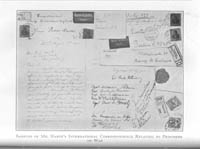 Though not luxurious, the facility was very attractive and had the air of a summer resort. The camp also
featured neat and well-kept streets, green grass, flower beds, and an Association hall. This hut was built
through the efforts of the camp commandant, Pastor Schrenk, and POW labor. It had one large room for church
services, lectures, and concerts, a reading and writing room, and small rooms for a library, musical practice,
and study. There were 1,200 books in the library for the Russian, British, and French POWs in the prison. The
sanitation facilities at Crossen-an-der-Oder were outstanding, with few cases of illness and even fewer deaths,
and relations between the Russian Orthodox priest and the Association were excellent. This optimistic report
reflected Harte's emphasis on the positive aspects of prison camp life. Later in this trip, the American
secretaries met with German YMCA workers in Barmen, in Westphalia. During the Barmen Conference, the
Association workers fully discussed the American plans. German YMCA officials promised their hearty
cooperation and commitment to the WPA program. The American secretaries then returned to Berlin, where Harte
prepared for his trip to Russia.17
Though not luxurious, the facility was very attractive and had the air of a summer resort. The camp also
featured neat and well-kept streets, green grass, flower beds, and an Association hall. This hut was built
through the efforts of the camp commandant, Pastor Schrenk, and POW labor. It had one large room for church
services, lectures, and concerts, a reading and writing room, and small rooms for a library, musical practice,
and study. There were 1,200 books in the library for the Russian, British, and French POWs in the prison. The
sanitation facilities at Crossen-an-der-Oder were outstanding, with few cases of illness and even fewer deaths,
and relations between the Russian Orthodox priest and the Association were excellent. This optimistic report
reflected Harte's emphasis on the positive aspects of prison camp life. Later in this trip, the American
secretaries met with German YMCA workers in Barmen, in Westphalia. During the Barmen Conference, the
Association workers fully discussed the American plans. German YMCA officials promised their hearty
cooperation and commitment to the WPA program. The American secretaries then returned to Berlin, where Harte
prepared for his trip to Russia.17
19
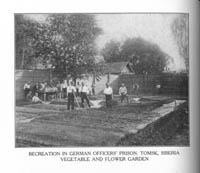 The International General Secretary left Berlin on 1 October 1915 on his second trip to Russia. Harte spent
six weeks touring prison camps in Turkestan and Siberia to assess Russian preparations for the approaching
winter. The German government provided him with two hundred thousand Marks to distribute to needy German POWs. Harte also
received fourteen thousand Marks from family members, in sums ranging from five to five hundred Marks, for delivery to
individual prisoners. He carried three sacks of Liebesgaben (care packages from loved ones in Germany),
one sack of letters and cards, two cases of musical instruments, a basket trunk with additional parcels, and one
box of songbooks of German folk songs in addition to his own baggage. Harte was accompanied by a Russian captain
who had lost his leg and been captured. This officer was the nephew of the Russian minister to Stockholm, and
Harte sought to arrange the release of German invalid prisoners in exchange for him. In addition, the Germans
wanted to demonstrate Harte's influence with their Ministry of War. This gesture, another example of the Principle
of Reciprocity, would help improve relations between the two belligerent nations and represented an important step
towards the exchange of seriously sick and invalid prisoners. Harte stopped in Vienna to discuss WPA operations
with the Austro-Hungarian Ministry of War, and described the American POW relief program in detail. Eager to provide
assistance to Dual Monarchy prisoners in Russia, the Austro-Hungarian government readily endorsed Harte's program
and agreed to allow American secretaries to begin operations on Austro-Hungarian territory. Austro-Hungarian
authorities also provided the American secretary with one hundred thousand Marks to disseminate to Dual Monarchy prisoners to
improve their condition. In addition, Harte carried 120,000 Marks from American contributors for Central Power
POWs.18
The International General Secretary left Berlin on 1 October 1915 on his second trip to Russia. Harte spent
six weeks touring prison camps in Turkestan and Siberia to assess Russian preparations for the approaching
winter. The German government provided him with two hundred thousand Marks to distribute to needy German POWs. Harte also
received fourteen thousand Marks from family members, in sums ranging from five to five hundred Marks, for delivery to
individual prisoners. He carried three sacks of Liebesgaben (care packages from loved ones in Germany),
one sack of letters and cards, two cases of musical instruments, a basket trunk with additional parcels, and one
box of songbooks of German folk songs in addition to his own baggage. Harte was accompanied by a Russian captain
who had lost his leg and been captured. This officer was the nephew of the Russian minister to Stockholm, and
Harte sought to arrange the release of German invalid prisoners in exchange for him. In addition, the Germans
wanted to demonstrate Harte's influence with their Ministry of War. This gesture, another example of the Principle
of Reciprocity, would help improve relations between the two belligerent nations and represented an important step
towards the exchange of seriously sick and invalid prisoners. Harte stopped in Vienna to discuss WPA operations
with the Austro-Hungarian Ministry of War, and described the American POW relief program in detail. Eager to provide
assistance to Dual Monarchy prisoners in Russia, the Austro-Hungarian government readily endorsed Harte's program
and agreed to allow American secretaries to begin operations on Austro-Hungarian territory. Austro-Hungarian
authorities also provided the American secretary with one hundred thousand Marks to disseminate to Dual Monarchy prisoners to
improve their condition. In addition, Harte carried 120,000 Marks from American contributors for Central Power
POWs.18
20
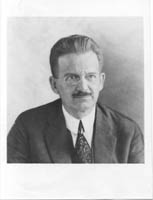 Successfully concluding his negotiations in Vienna, Harte traveled north to Stockholm. He met with the representatives of the Red Cross: Ira Morris (the U.S. Minister to Sweden), the Russian Minister to Sweden, and Swedish relief agencies interested in providing assistance to POWs in Russia. He showed motion pictures of relief operations in German prison camps at the royal palace. Most importantly, he demonstrated the practical effects of American charity for unfortunate POWs. Harte then continued to Petrograd, arriving in November 1915. He met with a group of influential Russian officers and reviewed the benefits of POW relief services for Russian war prisoners in Central Power prison camps. He emphasized the importance of establishing similar welfare operations for German, Austrian, and Hungarian POWs in prison camps across the Russian Empire. Harte and these officials set up the Russian Committee on War Prisoners' Aid on November 30, which created a legal entity in Russia able to dispense assistance to prisoners. This committee became the primary Russian organization for coordinating POW services between Russia, Germany, and Austria-Hungary, and established the foundation for YMCA prisoner relief operations in Eastern Europe. Having officially established WPA operations in Russia, Harte then embarked on a six-week tour of Russian prison camps in Turkestan and Siberia. The American YMCA secretary boarded a train on the Trans-Siberian Railway and Harte arrived in Irkutsk on 23 December 1915, the first prison camp on his itinerary. He visited six more prison facilities in the Russian Far East before he arrived in the vicinity of Vladivostok on 12 January 1916. Harte then proceeded west on the Chinese Eastern Railway across northern Manchuria and resumed his inspection of Russian prison camps at Dauriya on January 18. He stopped at eleven more prison facilities in central Siberia on his trip back to European Russia. His last prison camp inspection took place at Kurgan on February 9, before he proceeded to Petrograd to report his findings. During this tour, Harte distributed money, set up libraries, and identified camps that could benefit from Association halls. Harte's success in Russia firmly established WPA operations in the Tsarist Empire and laid the ground work for the expansion of POW relief service in Central and Western Europe.19
Successfully concluding his negotiations in Vienna, Harte traveled north to Stockholm. He met with the representatives of the Red Cross: Ira Morris (the U.S. Minister to Sweden), the Russian Minister to Sweden, and Swedish relief agencies interested in providing assistance to POWs in Russia. He showed motion pictures of relief operations in German prison camps at the royal palace. Most importantly, he demonstrated the practical effects of American charity for unfortunate POWs. Harte then continued to Petrograd, arriving in November 1915. He met with a group of influential Russian officers and reviewed the benefits of POW relief services for Russian war prisoners in Central Power prison camps. He emphasized the importance of establishing similar welfare operations for German, Austrian, and Hungarian POWs in prison camps across the Russian Empire. Harte and these officials set up the Russian Committee on War Prisoners' Aid on November 30, which created a legal entity in Russia able to dispense assistance to prisoners. This committee became the primary Russian organization for coordinating POW services between Russia, Germany, and Austria-Hungary, and established the foundation for YMCA prisoner relief operations in Eastern Europe. Having officially established WPA operations in Russia, Harte then embarked on a six-week tour of Russian prison camps in Turkestan and Siberia. The American YMCA secretary boarded a train on the Trans-Siberian Railway and Harte arrived in Irkutsk on 23 December 1915, the first prison camp on his itinerary. He visited six more prison facilities in the Russian Far East before he arrived in the vicinity of Vladivostok on 12 January 1916. Harte then proceeded west on the Chinese Eastern Railway across northern Manchuria and resumed his inspection of Russian prison camps at Dauriya on January 18. He stopped at eleven more prison facilities in central Siberia on his trip back to European Russia. His last prison camp inspection took place at Kurgan on February 9, before he proceeded to Petrograd to report his findings. During this tour, Harte distributed money, set up libraries, and identified camps that could benefit from Association halls. Harte's success in Russia firmly established WPA operations in the Tsarist Empire and laid the ground work for the expansion of POW relief service in Central and Western Europe.19
The American YMCA Offers POW Work in Italy
21
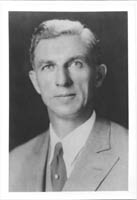 After Italy's entry into the war, the American YMCA sent representatives to Rome to offer POW services as part
of the Principle of Reciprocity.The president of the National Council of the Italian YMCA wrote to the World Committee of the World's Alliance
of YMCAs in Geneva for assistance in May 1915. Carlisle Hibbard and Darius Alton Davis (who would replace Hibbard
as the American YMCA's Senior Secretary by the summer of 1915, when the latter returned to New York to supervise
American YMCA relief in Europe as a key member of the International Committee) arrived from Paris in June
1915.20
After Italy's entry into the war, the American YMCA sent representatives to Rome to offer POW services as part
of the Principle of Reciprocity.The president of the National Council of the Italian YMCA wrote to the World Committee of the World's Alliance
of YMCAs in Geneva for assistance in May 1915. Carlisle Hibbard and Darius Alton Davis (who would replace Hibbard
as the American YMCA's Senior Secretary by the summer of 1915, when the latter returned to New York to supervise
American YMCA relief in Europe as a key member of the International Committee) arrived from Paris in June
1915.20
22
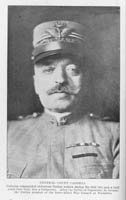 At this point, Italy had been at war with Austria-Hungary for only a few weeks, and the Italians had not captured
a significant number of prisoners.
At this point, Italy had been at war with Austria-Hungary for only a few weeks, and the Italians had not captured
a significant number of prisoners.
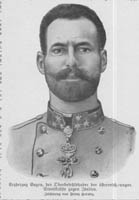 The Italian Army was conducting a series of offensives along the Isonzo, a sixty-mile front. The Italian commander, General Luigi Cardorna, sought to seize the Austro-Hungarian mountain
strongholds before seasoned Austrian divisions could arrive from the Galician Front. The Habsburg commander,
Archduke Eugene, held the strategic bridgeheads of Gorizia and Tolmino, and never allowed the Italians to advance
more than a few miles.21
The Italian Army was conducting a series of offensives along the Isonzo, a sixty-mile front. The Italian commander, General Luigi Cardorna, sought to seize the Austro-Hungarian mountain
strongholds before seasoned Austrian divisions could arrive from the Galician Front. The Habsburg commander,
Archduke Eugene, held the strategic bridgeheads of Gorizia and Tolmino, and never allowed the Italians to advance
more than a few miles.21
23
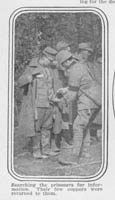 Hibbard and Davis met with Italian government leaders to offer Association welfare services for POWs and Italian
soldiers, but failed to reach any substantive results. Instead, they met with leaders of the Student Movement
and City Associations of Rome and Genoa to help them assist Italian troops and POWs. The International Committee
forwarded $1,000 to the Italian branch of the World's Student Christian Federation for relief work for soldiers
and POWs in Italy, and the English National YMCA Council offered similar support. Despite this foreign aid, the
Italian government was focused on military mobilization, and was not concerned with prisoner welfare at this point
in the war.22
Hibbard and Davis met with Italian government leaders to offer Association welfare services for POWs and Italian
soldiers, but failed to reach any substantive results. Instead, they met with leaders of the Student Movement
and City Associations of Rome and Genoa to help them assist Italian troops and POWs. The International Committee
forwarded $1,000 to the Italian branch of the World's Student Christian Federation for relief work for soldiers
and POWs in Italy, and the English National YMCA Council offered similar support. Despite this foreign aid, the
Italian government was focused on military mobilization, and was not concerned with prisoner welfare at this point
in the war.22
24
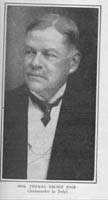 Davis returned in October 1915 to renew his contacts with Italian officials. By this time, the American YMCA
had begun POW operations for Central Power prisoners in France, and Davis brought letters of support from
French officials. The U.S. Ambassador to Italy, Thomas Nelson Page, also provided Davis with an introduction,
which enabled the secretary to meet with General Paolo Springardi, the President of the War Prisoners' Commission;
Signor Vigliani, the Assistant Minister of the Interior; the Assistant Minister of War; the Assistant Minister of
Foreign Affairs; and the Assistant Minister of Finance. Davis' mission was also bolstered by the American YMCA's
successful POW relief programs for Allied prisoners in the Dual Monarchy, a service that would benefit Italian
POWs held by the Austro-Hungarians. By this time, the Italians had completed their third offensive against the
Isonzo Front, and had captured a number of Austro-Hungarian POWs. With the support of French and American
officials, Davis enjoyed a favorable reception from Italian authorities. On 22 November 1915, Vigliani and
Springardi extended official authorization for Davis to visit civilian internment camps on Sardinia. This
authorization included permission to distribute books and assistance to the interned Austro-Hungarian
civilians.23
Davis returned in October 1915 to renew his contacts with Italian officials. By this time, the American YMCA
had begun POW operations for Central Power prisoners in France, and Davis brought letters of support from
French officials. The U.S. Ambassador to Italy, Thomas Nelson Page, also provided Davis with an introduction,
which enabled the secretary to meet with General Paolo Springardi, the President of the War Prisoners' Commission;
Signor Vigliani, the Assistant Minister of the Interior; the Assistant Minister of War; the Assistant Minister of
Foreign Affairs; and the Assistant Minister of Finance. Davis' mission was also bolstered by the American YMCA's
successful POW relief programs for Allied prisoners in the Dual Monarchy, a service that would benefit Italian
POWs held by the Austro-Hungarians. By this time, the Italians had completed their third offensive against the
Isonzo Front, and had captured a number of Austro-Hungarian POWs. With the support of French and American
officials, Davis enjoyed a favorable reception from Italian authorities. On 22 November 1915, Vigliani and
Springardi extended official authorization for Davis to visit civilian internment camps on Sardinia. This
authorization included permission to distribute books and assistance to the interned Austro-Hungarian
civilians.23
25
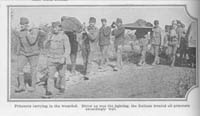 During a twelve-day trip, Davis visited seventeen centers on the island and inspected approximately one-fourth
of the interned population. Davis did not find concentration camps on Sardinia; instead, the Italians had
distributed the interned Austro-Hungarians to villages across the island. They were free to rent their own
rooms and move freely around the towns to which they were assigned. If interned civilians lacked their own
means of support, the Italian government provided a subsidy so that the civilians could arrange their own
food and shelter. In relation to other countries, poverty among the Austro-Hungarian internees was comparatively
minimal. During this visit, Davis provided encouragement and good cheer to these internees. The American
secretary was the first foreign agent permitted to meet the captives since the beginning of the war. Davis
made it easier for Austro-Hungarian internees to receive books and reading matter, and he worked to improve
the correspondence system so that internees could contact friends and family at home.24
During a twelve-day trip, Davis visited seventeen centers on the island and inspected approximately one-fourth
of the interned population. Davis did not find concentration camps on Sardinia; instead, the Italians had
distributed the interned Austro-Hungarians to villages across the island. They were free to rent their own
rooms and move freely around the towns to which they were assigned. If interned civilians lacked their own
means of support, the Italian government provided a subsidy so that the civilians could arrange their own
food and shelter. In relation to other countries, poverty among the Austro-Hungarian internees was comparatively
minimal. During this visit, Davis provided encouragement and good cheer to these internees. The American
secretary was the first foreign agent permitted to meet the captives since the beginning of the war. Davis
made it easier for Austro-Hungarian internees to receive books and reading matter, and he worked to improve
the correspondence system so that internees could contact friends and family at home.24
26 Davis wrote a favorable report about the conditions on Sardinia and forwarded a copy to General Springardi. When Davis returned to Rome in early December, he found Springardi willing to let him visit any military prison he chose. Davis studied the situation and wrote a report for the War Prisoners' Commission outlining what the American YMCA could offer in terms of work with POWs. Davis decided to visit five forts/prisons containing POWs in the Genoa military region, before returning to Geneva to resume his duties as Senior Secretary for Europe.25
27 From the beginning, Davis made it clear to Italian officials that his duty was not to conduct prison inspections. Instead, the YMCA sought to cooperate with the Italian government to promote the moral and intellectual health of POWs in Italian camps. This was an important consideration, especially since a strong national distaste for alien influences on military policy existed in Italy. That the American YMCA was a Protestant social welfare organization attempting to increase its influence in Catholic Italy did not ease the preliminary negotiations. During his visits to the Genoa prison camps, Davis noted that the Austro-Hungarian prisoners were well supplied with food, clothing, and lodging, but lacked useful occupations and recreation to maintain their sanity and moral health. While the Italian government did not ban the distribution of reading material to POWs, no organization existed to provide such a service. Dr. Jean-Henri-Adolphe d'Espine, Vice President of the International Red Cross Society, inspected Italian military prison camps shortly after Davis' trip and came to similar conclusions. D'Espine found that the POWs needed to occupy their time, and noted that nothing was as demoralizing as "constant idleness." He was encouraged to learn that the YMCA was prepared to send books, games, and music to war prisoners, items that the International Red Cross did not distribute. Davis arranged with Red Cross authorities to supply requests through the Geneva organization. In return, d'Espine promised to write to military authorities in Rome to support the American YMCA WPA program. Davis also found that the Italian government had already started a school for illiterates and offered Italian classes to POWs. Camp officials were overwhelmed by the number of languages spoken by prisoners from the Austro-Hungarian Empire, since comparatively few spoke German. The prisoners requested books from Davis, especially scientific works, and musical instruments to help them pass time. This initial work represented the Association's first steps towards establishing POW work in Italy.26
28 Inspired by Davis' success with Austro-Hungarian POWs, the International Committee authorized funds for War Prisoners' Aid work in Italy; on 11 December 1915, John R. Mott allocated $5,000 to establish WPA work in Italian POW camps. The General Secretary declared: "A complete history of this work in behalf of millions of prisoners in all the warring lands would constitute a new record in humanitarian endeavor."27 Due to delays in the mail, however, the World's Committee in Geneva did not receive this authorization until December 31. As a result, POWs incarcerated in Italy did not receive the customary Christmas cheer from the YMCA that prisoners in other countries enjoyed. American YMCA secretaries recognized that the Christmas season was particularly difficult for war prisoners, far from home and loved ones, and with no end to the war in sight.28
29
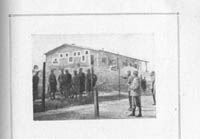 In January 1916, Dr. Walter Lowrie, an American clergyman living in Rome, replaced Davis as the American
Association's representative in Italy. In an important breakthrough, the Italian government requested that
Ambassador Penfield inspect the Austro-Hungarian prison camp in Mauthausen, in Upper Austria. The government
was concerned about the treatment of Italian POWs. With the approval of Ambassador Page, Davis inspected the
camp in June 1916 to assess conditions. As a gesture of good faith, the Dual Monarchy opened Mauthausen to the
YMCA and permitted the Association to construct a hut. In exchange, the Italian government agreed in July 1916
to grant the American YMCA access to the prison camp in Ancona, and allowed the establishment of an Association
hut. The Italians granted further concessions to Lowrie's replacement, M. B. Rideout, in November 1916. The
Association gained access and permission to build huts at Avezzano and Padua in early December, the two largest
prison camps in Italy.29
In January 1916, Dr. Walter Lowrie, an American clergyman living in Rome, replaced Davis as the American
Association's representative in Italy. In an important breakthrough, the Italian government requested that
Ambassador Penfield inspect the Austro-Hungarian prison camp in Mauthausen, in Upper Austria. The government
was concerned about the treatment of Italian POWs. With the approval of Ambassador Page, Davis inspected the
camp in June 1916 to assess conditions. As a gesture of good faith, the Dual Monarchy opened Mauthausen to the
YMCA and permitted the Association to construct a hut. In exchange, the Italian government agreed in July 1916
to grant the American YMCA access to the prison camp in Ancona, and allowed the establishment of an Association
hut. The Italians granted further concessions to Lowrie's replacement, M. B. Rideout, in November 1916. The
Association gained access and permission to build huts at Avezzano and Padua in early December, the two largest
prison camps in Italy.29
30
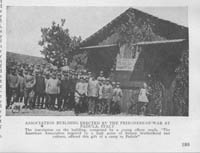 Despite these promising advancements, Italian delays in initiating these POW relief projects almost led to
Austria-Hungary to retaliate by limiting American YMCA operations. Italian procrastination in the construction
of YMCA facilities, due to insufficient funding and incorrect permits, forced the Austro-Hungarian government
to threaten to close down YMCA operations for Italian POWs. Davis immediately responded to the crisis by
contacting Mott, and the International Committee cabled $5,000 to finance Association construction projects in
Italy. The Italians reissued permits, and disaster was narrowly avoided. Despite the prompt American response,
Italian construction proceeded slowly due to the scarcity of building materials, labor, and transportation, but
the Austro-Hungarian government permitted the YMCA to continue to develop its program for Italian prisoners.30
Despite these promising advancements, Italian delays in initiating these POW relief projects almost led to
Austria-Hungary to retaliate by limiting American YMCA operations. Italian procrastination in the construction
of YMCA facilities, due to insufficient funding and incorrect permits, forced the Austro-Hungarian government
to threaten to close down YMCA operations for Italian POWs. Davis immediately responded to the crisis by
contacting Mott, and the International Committee cabled $5,000 to finance Association construction projects in
Italy. The Italians reissued permits, and disaster was narrowly avoided. Despite the prompt American response,
Italian construction proceeded slowly due to the scarcity of building materials, labor, and transportation, but
the Austro-Hungarian government permitted the YMCA to continue to develop its program for Italian prisoners.30
Serbia and POW Diplomacy
31
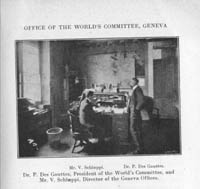 The proverbial "fly in the ointment" of reciprocal diplomacy was Serbia. The World's Committee of the World's
Alliance negotiated with the Serbian government for services for Dual Monarchy POWs in that kingdom. Dr.
Paul Des Gouttes, a member of the World's Committee and the Honorary General Secretary of the International
Red Cross Committee, contacted the Serbian Red Cross Society in June 1915 and conveyed the Austro-Hungarian
government's demand for POW service reciprocity. Des Gouttes proposed the construction of a YMCA hut in
Serbia, which would clear the way for a third hut in Austria-Hungary for Serbian prisoners. Mott agreed to
finance this project in September, and the Serbian government granted the Association permission to begin
POW services. This permission came too late, however, as a joint German, Austro-Hungarian, and Bulgarian
offensive overran Serbia in October 1915. Of the sixty thousand Central Power POWs held by the Serbs, two-thirds
perished in the retreat. The survivors were interned on the island of Sardinia and eventually transferred
to labor detachments in France. The Austro-Hungarian demand for POW service reciprocity became a moot point
after Serbia was occupied.31
The proverbial "fly in the ointment" of reciprocal diplomacy was Serbia. The World's Committee of the World's
Alliance negotiated with the Serbian government for services for Dual Monarchy POWs in that kingdom. Dr.
Paul Des Gouttes, a member of the World's Committee and the Honorary General Secretary of the International
Red Cross Committee, contacted the Serbian Red Cross Society in June 1915 and conveyed the Austro-Hungarian
government's demand for POW service reciprocity. Des Gouttes proposed the construction of a YMCA hut in
Serbia, which would clear the way for a third hut in Austria-Hungary for Serbian prisoners. Mott agreed to
finance this project in September, and the Serbian government granted the Association permission to begin
POW services. This permission came too late, however, as a joint German, Austro-Hungarian, and Bulgarian
offensive overran Serbia in October 1915. Of the sixty thousand Central Power POWs held by the Serbs, two-thirds
perished in the retreat. The survivors were interned on the island of Sardinia and eventually transferred
to labor detachments in France. The Austro-Hungarian demand for POW service reciprocity became a moot point
after Serbia was occupied.31
Bulgaria and War Prisoner Relief
32
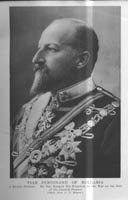 Bulgaria entered the war on 12 October 1915 on the side of the Central Powers to participate in the
dismemberment of Serbia. The Serbs had repulsed two Austro-Hungarian invasion attempts since the beginning
of the war in July 1914. Stymied by Serbian obstinacy, the Central Powers courted Tsar Ferdinand in 1915
and easily persuaded the Bulgarians to join ranks against Serbia. The Balkans was an unstable region long
before the general European war began. Bulgaria had allied with Serbia, Montenegro, and Greece in the First
Balkan League, and went to war against Turkey in 1912. Ottoman misrule in Macedonia sparked the First Balkan
War, and within six weeks the Balkan allies drove within twenty-five miles of Constantinople. The Turks
sued for peace and signed the Treaty of London in January 1913. The Ottomans surrendered most of their
European territory, and the Bulgarians emerged the clear victors, but peace in the Balkans was far from
secure.32
Bulgaria entered the war on 12 October 1915 on the side of the Central Powers to participate in the
dismemberment of Serbia. The Serbs had repulsed two Austro-Hungarian invasion attempts since the beginning
of the war in July 1914. Stymied by Serbian obstinacy, the Central Powers courted Tsar Ferdinand in 1915
and easily persuaded the Bulgarians to join ranks against Serbia. The Balkans was an unstable region long
before the general European war began. Bulgaria had allied with Serbia, Montenegro, and Greece in the First
Balkan League, and went to war against Turkey in 1912. Ottoman misrule in Macedonia sparked the First Balkan
War, and within six weeks the Balkan allies drove within twenty-five miles of Constantinople. The Turks
sued for peace and signed the Treaty of London in January 1913. The Ottomans surrendered most of their
European territory, and the Bulgarians emerged the clear victors, but peace in the Balkans was far from
secure.32
33 Unsatisfied with the peace terms, Serbia, Romania, Greece, and Turkey joined forces, seeking to redress the balance of power in the region. Not satiated with their gains, the Bulgarians launched a preemptive strike against Serbia and Greece to gain control of Macedonia in June 1913. The Bulgarian invasion stalled, and Romania and Turkey struck against Bulgaria. Caught off guard, the Bulgarians had no other choice but to submit to an armistice, and in August 1913, the Bulgarians signed the Treaty of Bucharest. The Bulgarians lost most of the territory they had won in the First Balkan War, retaining only a small strip of land along the Aegean coast. When German and Austro-Hungarian officials approached in 1915, the Bulgarians were eager to humble the Serbians.33
34
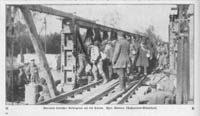 In October 1915, the Bulgarians mobilized their 360,000-man army, just as a 250,000-man Austro-German
army struck northern Serbia. The Serbs tenaciously resisted the Austro-German invasion, but their position
became critical when two Bulgarian armies flooded into eastern Serbia. Caught between the Bulgarian and the
Austro-German armies, the Serbians had no choice but to retreat. Their defenses collapsed by December, and
the Serbians suffered terribly from cold, disease, and starvation. Only a small part of the Serbian Army
escaped to join the Anglo-French forces in northern Greece. The Bulgarians captured large numbers of Serbian
prisoners, and were confronted with the task of caring for these unfortunates.34
In October 1915, the Bulgarians mobilized their 360,000-man army, just as a 250,000-man Austro-German
army struck northern Serbia. The Serbs tenaciously resisted the Austro-German invasion, but their position
became critical when two Bulgarian armies flooded into eastern Serbia. Caught between the Bulgarian and the
Austro-German armies, the Serbians had no choice but to retreat. Their defenses collapsed by December, and
the Serbians suffered terribly from cold, disease, and starvation. Only a small part of the Serbian Army
escaped to join the Anglo-French forces in northern Greece. The Bulgarians captured large numbers of Serbian
prisoners, and were confronted with the task of caring for these unfortunates.34
35
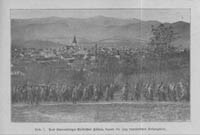 Romania's ill-advised decision to enter World War I on the side of the Allies in August 1916 had repercussions
for Bulgaria. The Romanian Army failed to make much headway into Transylvania, and the Central Powers launched
a devastating counter-offensive in late September. Bulgaria invaded southern Romania in coordination with
the Austro-German offensive. The Romanian Army reeled back into Moldavia, and by December the Central Powers
occupied Wallachia and Dobrudja. The Bulgarians now also had large numbers of Romanian POWs to feed and
clothe.35
Romania's ill-advised decision to enter World War I on the side of the Allies in August 1916 had repercussions
for Bulgaria. The Romanian Army failed to make much headway into Transylvania, and the Central Powers launched
a devastating counter-offensive in late September. Bulgaria invaded southern Romania in coordination with
the Austro-German offensive. The Romanian Army reeled back into Moldavia, and by December the Central Powers
occupied Wallachia and Dobrudja. The Bulgarians now also had large numbers of Romanian POWs to feed and
clothe.35
36 Conditions in Bulgaria were terrible during World War I, and the Bulgarians lacked the resources to care for Allied prisoners. The Bulgarian YMCA wanted to assist POWs, but wartime mobilization had decimated the organization's ranks. The Bulgarian National YMCA Committee pleaded with the World's Alliance and the American YMCA for help. Phildius traveled to Bulgaria in the fall of 1916 and inspected prison camps. He found the Bulgarian government very receptive to Association assistance, and negotiated a general POW relief agreement by January 1917. In response to Phildius' success, the International Committee agreed to support the World's Alliance effort with funding and personnel. (The WPA program in Bulgaria will be addressed in greater detail in a later chapter.)36
Romania Enters the War
37
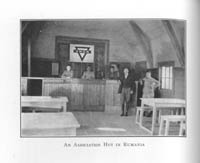 The last participant in POW reciprocity diplomacy was Romania. In light of the apparent success of the
Russians' Brusilov Offensive against the Dual Monarchy, Romania declared war on Austria-Hungary on 27
August 1916 and attempted to advance into Transylvania. Bulgaria declared war on Romania on September 1 which forced the Romanians to defend their southern border. In late September Austro-German forces counter-attacked,
and the Bulgarians advanced into Dobrudja from the south in October. By December, Bucharest fell to the
Central Powers, leaving only Moldavia under Romanian control. Harte visited the provisional capital at
Jassy to offer American YMCA assistance to the kingdom. The Romanian royal family and government officials
were very concerned about the treatment of Romanian POWs under Central Power control and formally requested
Association aid. POW services began in Romania after the Austro-Hungarian Red Cross asked the American YMCA for reciprocal
treatment for Dual Monarchy prisoners under Romanian control. American secretaries began
POW work with Romanian POWs in occupied Romania and Serbia. These secretaries received a unique semi-official
status as delegates of the American Legation. This appointment provided the secretaries greater authority in
official camp inspection reports, as well as enhanced freedom of action.37
The last participant in POW reciprocity diplomacy was Romania. In light of the apparent success of the
Russians' Brusilov Offensive against the Dual Monarchy, Romania declared war on Austria-Hungary on 27
August 1916 and attempted to advance into Transylvania. Bulgaria declared war on Romania on September 1 which forced the Romanians to defend their southern border. In late September Austro-German forces counter-attacked,
and the Bulgarians advanced into Dobrudja from the south in October. By December, Bucharest fell to the
Central Powers, leaving only Moldavia under Romanian control. Harte visited the provisional capital at
Jassy to offer American YMCA assistance to the kingdom. The Romanian royal family and government officials
were very concerned about the treatment of Romanian POWs under Central Power control and formally requested
Association aid. POW services began in Romania after the Austro-Hungarian Red Cross asked the American YMCA for reciprocal
treatment for Dual Monarchy prisoners under Romanian control. American secretaries began
POW work with Romanian POWs in occupied Romania and Serbia. These secretaries received a unique semi-official
status as delegates of the American Legation. This appointment provided the secretaries greater authority in
official camp inspection reports, as well as enhanced freedom of action.37
Conclusion
38
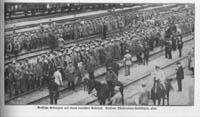 By the middle of 1916, the American YMCA had achieved remarkable diplomatic success, gaining access to war
prison camps in all of the belligerent nations, with the exception of Turkey. Despite this triumph, permission
to operate welfare programs in Central Power camps was only the first step in the challenge facing the
Association. Red Triangle secretaries still had to deal with foreign governments to expand their operations and
introduce new services to aid as many POWs as possible. To develop Association programs in prison camps, individual
secretaries had to win the confidence of both prisoners and their guards. The methods employed by secretaries
to implement the four-fold Red Triangle program are the subject of the next part of this work.
By the middle of 1916, the American YMCA had achieved remarkable diplomatic success, gaining access to war
prison camps in all of the belligerent nations, with the exception of Turkey. Despite this triumph, permission
to operate welfare programs in Central Power camps was only the first step in the challenge facing the
Association. Red Triangle secretaries still had to deal with foreign governments to expand their operations and
introduce new services to aid as many POWs as possible. To develop Association programs in prison camps, individual
secretaries had to win the confidence of both prisoners and their guards. The methods employed by secretaries
to implement the four-fold Red Triangle program are the subject of the next part of this work.
Notes:
Note 1: Christian Phildius, "Geneva, April 29, 1915," For the Millions of Men Now Under Arms 1 (24 June 1915): 35; "Austria-Hungary: Work Among Soldiers," For the Millions of Men Now Under Arms 1 (31 January 1916): 40; Eberhard Phildius, "For Soldiers: Establishing Homes," For the Millions of Men Now Under Arms 2 (1 June 1917): 40; "Hauptverband Christlicher Vereine jünger Männer innerhalb Osterreichs," No Date , 1-10. Box X391.1: "War Work YMCA, 1914-1918: In Austria: Soldiers' Homes; in Switzerland: Commission Militaire Romande (Maisons du Soldats), Commission Romande des Internees; in Germany: Soldatenheim, Kriegsfürsorge." Section 436: "Austria." Folder X391.1 (436): War Work YMCA Soldiers' Homes in Austria, 1915-1917. World's Alliance of YMCAs Archives, Geneva, Switzerland; and The Young Men's Christian Association in Austria, circa 1922, 4. International Division Box 12: "Austria: Central YMCA, World Youth Funds, Camp Sibley, 1950's-1970's, Student Hostel, 1920-1933, Year Books; Switzerland: World's Alliance Headquarters, Yearbook 1900." File: "Austria: Miscellaneous Print." Kautz Family YMCA Archives, University of Minnesota Libraries, Minneapolis, MN. back
Note 2: "Extracts from a Letter from a Student Secretary in Austria, January 6, 1915," For the Millions of Men Now Under Arms 1 (1 March 1915): 17-18; "From the Secretary of the Student Movement in Austria, Vienna, April 3, 1915," For the Millions of Men Now Under Arms 1 (24 June 1915): 40-41; "The Secretary of the World's Committee Working in Austria-Hungary, April 1, 1915," For the Millions of Men Now Under Arms 1 (24 June 1915): 39; "Austria-Hungary: For Prisoners of War," For the Millions of Men Now Under Arms 2 (1 June 1917): 30; "Each in His Own Religion," For the Millions of Men Now Under Arms 2 (1 June 1917): 40; The Young Men's Christian Association in Austria, circa 1922, 2. International Division Box 12: "Austria: Central YMCA, World Youth Funds, Camp Sibley, 1950's-1970's, Student Hostel, 1920-1933, Year Books; Switzerland: World's Alliance Headquarters, Yearbook 1900." File: "Austria: Miscellaneous Print." Kautz Family YMCA Archives, University of Minnesota Libraries, Minneapolis, MN. back
Note 3: Christian Phildius, "From the Secretary for Austria-Hungary, Vienna, March, 1915," For the Millions of Men Now Under Arms, 1 (April 12, 1915), pp. 20-21; Phildius, "Geneva, April 29, 1915," 35; and Christian Phildius, "The Secretary of the World's Committee Working in Austria-Hungary, April 1, 1915," For the Millions of Men Now Under Arms 1 (24 June 1915), 40. back
Note 4: Ambassador Penfield provided diplomatic support for Phildius' initial contacts with the Austro-Hungarian government, including a letter of introduction and recommendation. John R. Mott to Frederick C. Penfield, 19 October 1914, Berlin, 1. John R. Mott Papers, Box 70, Folder 1279. Yale School of Divinity, New Haven, CT; Field Marshal Lieutenant Urban to Frederick C. Penfield, "Letter to the American Embassy from the Austrian Government, Vienna, May 31, 1915," For the Millions of Men Now Under Arms 1 (15 September 1915): 45; Frederick C. Penfield to John R. Mott, "Letter from the American Ambassador at Vienna, June 3, 1915," For the Millions of Men Now Under Arms 1 (15 September 1915): 46; Christian Phildius to John R. Mott, "World's Alliance of the Young Men's Christian Associations, Geneva," For the Millions of Men Now Under Arms 1 (15 September 1915): 46; "Austria," For the Millions of Men Now Under Arms 1 (31 July 1916): 37; Frederick C. Penfield to Christian Phildius, May 31, 1915, Vienna, p. 1. Box X391.1: "War Work YMCA, 1914-1918: In Austria: Soldiers' Homes; in Switzerland: Commission Militaire Romande (Maisons du Soldats), Commission Romande des Internees; in Germany: Soldatenheim, Kriegsfürsorge." Section 436: "Austria." Folder: "War Prisoners' Aid in Austria: Records and Copies of Correspondence of Mr. Christian Phildius, 1914-1918"; Freiherr von Spiegelfeld to Christian Phildius, 5 October 1916, Vienna, 1. Lieutenant Field Marshal Urban to Christian Phildius, 23 October 1916, Vienna, 1. Christian Phildius to Paul Des Gouttes, 31 October 1916, Vienna, 1-3. Box X391: "War Work Y.M.C.A., 1914-1918: World's Committee, Geneva." Folder: "War Work of World's Committee-Reports of Christian Phildius." World's Alliance of YMCAs Archives, Geneva, Switzerland. back
Note 5: Lieutenant Field Marshal Urban for Sir Alarad von Szilassy to Christian Phildius, 29 May 1915, Vienna, 1. Box X391.1: "War Work YMCA, 1914-1918: In Austria: Soldiers' Homes; in Switzerland: Commission Militaire Romande (Maisons du Soldats), Commission Romande des Internees; in Germany: Soldatenheim, Kriegsfürsorge." Section 436: "Austria." Folder: "War Prisoners' Aid in Austria: Records and Copies of Correspondence of Mr. Christian Phildius, 1914-1918." World's Alliance of YMCAs Archives, Geneva, Switzerland. back
Note 6: James W. Gerard, "Germany: Cable from Ambassador Gerard through the State Department, Washington, August 2, 1915, to John R. Mott," For the Millions of Men Now Under Arms 1 (15 September 1915), 13; and Olin D. Wannamaker, For the Six Million Prisoners: The Welfare Work of the YMCA in the Prison Camps of Ten Nations during World War (Unpublished manuscript, 1921), 75-76. Armed Services Records Box 53. Folder: "Prisoner of War Report-Olin D. Wannamaker-1921." Kautz Family YMCA Archives, University of Minnesota Libraries, Minneapolis, MN. back
Note 7: Ethan T. Colton, Forty Years with Russians (New York: Association Press, 1940), 14-18; William Howard Taft, Frederick Harris, Frederic Houston Kent, and William J. Newlin, eds., Service with Fighting Men: An Account of the Work of the American Young Men's Christian Association in the World War, 2 vols. (New York: Association Press, 1922), 2:294; and Kenneth Scott Latourette, World Service: A History of the Foreign Work and World Service of the Young Men's Christian Associations of the United States and Canada (New York: Association Press, 1957), 34. back
Note 8: Archibald C. Harte and George M. Day, "Russia: Visit of Harte and Day to the Hospitals and German Prisoners' Camps in Russia and Siberia, Petrograd, June 25, 1915," For the Millions of Men Now Under Arms 1 (15 September 1915): 5-10; Archibald C. Harte, "A Stirring Appeal to Help in the German Prisoners' Camps, Tomsk, June 7, 1915," For the Millions of Men Now Under Arms 1 (15 September 1915): 10-11; Executive of the World's Committee of YMCAs, "World's Committee of Young Men's Christian Associations, Plenary Meeting of 1920 at Geneva: Report of the Executive for the Period July 1914 to June 1920," The Sphere 2:3 (1921): 197; and Conrad Hoffman, Jr., In the Prison Camps of Germany: A Narrative of "Y" Service among Prisoners of War (New York: Association Press, 1920), 18. back
Note 9: George M. Day, "From Day, Student Secretary in Petrograd, July 3, 1915," For the Millions of Men Now Under Arms 1 (15 September 1915): 12-13. back
Note 10: Hoffman, In the Prison Camps of Germany, 17; General Report, circa March 1917, 1. World's Alliance Box X391.2: "War Prisoners' Aid YMCA, 1914-1915; POW Camps in Germany and France; War Guilt Question." Section 43: "Germany." Folder X391.2 (43): "War Prisoners' Aid in Germany, 1914-1918." World's Alliance of YMCA Archives, Geneva, Switzerland; and Wannamaker, Six Million, 86-87. back
Note 11: George M. Day to John R. Mott, "Tomsk, June 7, 1915," For the Millions of Men Now Under Arms 1 (15 September 1915): 10-11; George M. Day to John R. Mott, "Petrograd, July 3, 1915," For the Millions of Men Now Under Arms 1 (15 September 1915): 12-13; "Work for Russian and Serbian Prisoners in Austria-Hungary, July 3, 1915," 48; Christian Phildius, Austro-Hungarian Ministry of War to Archibald C. Harte, "Telegrams," For the Millions of Men Now Under Arms 1 (31 January 1916): 41; Taft, Harris, Kent, and Newlin, Service with Fighting Men, 2:305-6; and Hoffman, In the Prison Camps of Germany, 22-27. back
Note 12: One member of the Danish Red Cross commission was Princess Jaschwil of Russia, who was deeply interested in the welfare of Russian POWs in the Central Power nations and supported Harte's work. In addition, General Adrian, the Austrian Inspector-General of POW Camps, expressed his approval about the YMCA POW program and interviewed Phildius about future expansion at the inauguration. "Work for Russian and Serbian Prisoners in Austria-Hungary, July 3, 1915," For the Millions of Men Now Under Arms 1 (15 September 1915), 47; Christian Phildius, "Prisoners of War in Austria-Hungary," For the Millions of Men Now Under Arms 1 (31 January 1916), 41; Karl Fries and Christian Phildius, "Prisoners of War in Austria-Hungary," For the Millions of Men Now Under Arms 1 (15 April 1916), 34; James E. Sprunger, "From James E. Sprunger's Account of His Recent Trip to Austria," For the Millions of Men Now Under Arms 1 (15 April 1916), 35-37; and Christian Phildius to John R. Mott, December 1915. John R. Mott Papers, Box 70, Folder 1279, Yale School of Divinity, New Haven, CT. back
Note 13: It is interesting to note that Hoffman changed his name several times during the war, which may have reflected the changing political situations he faced. Prior to his departure for Britain, he signed his name Conrad Hoffmann. After arriving in Germany, he adopted the German spelling of his given name, Konrad. However, when he published his book in the United States after the war, he Anglicized his name to Conrad Hoffman by dropping the second "n." Hoffman, In the Prison Camps of Germany, 1-3, 7-9, and 21; Taft, Harris, Kent, and Newlin, Service with Fighting Men, 2:294; and Wannamaker, Six Million, 109. back
Note 14: Hoffman, In the Prison Camps of Germany, 21. back
Note 15: Conrad Hoffman, "Germany: Impressions of a Secretary," For the Millions of Men Now Under Arms, 1 (6 December 1915): 42-44; and Hoffman, In the Prison Camps of Germany, 18-22. back
Note 16: "Secretaries for Work in Germany," No Date, 1. Armed Services Records Box AS-20. Box X673.6: "Reports, Clippings, Publications, 1915-1921: World War #1: Prisoners of War." Folder E: "Prisoners of War, YMCA Work for Germany." Kautz Family YMCA Archives, University of Minnesota Libraries, Minneapolis, MN. back
Note 17: Hoffman, In the Prison Camps of Germany, 22-24; and Archibald C. Harte, "Crossen War Prizon [sic]: 'There Is Beauty All Around, When There Is Love at Home,'" circa August 1915, pp. 1-5. "War Prison Camps in Europe: Scenes of Y.M.C.A. Work," New York Daily News, (October 30, 1915), p. 5. Box X673.6: "Reports, Clippings, Publications, 1915-1921: World War #1: Prisoners of War." Folder E: "Prisoners of War, YMCA Work for Germany." Kautz Family YMCA Archives, University of Minnesota Libraries, Minneapolis, MN. back
Note 18: Archibald C. Harte, "Mr. Harte's Recent Sojourn in Germany," For the Millions of Men Now Under Arms 1 (6 December 1915): 47; Hoffman, In the Prison Camps of Germany, 25-26; Conrad Hoffman, "Prisoners of War in Germany: Letters from Conrad Hoffman," For the Millions of Men Now Under Arms 1 (31 January 1916): 36; "Samples of Mr. Harte's International Correspondence Relating to Prisoners of War," For the Millions of Men Now Under Arms 1 (6 December 1915): 42B; Archibald C. Harte, "With the Prisoners of War," in In the Camps, Trenches, and Prisons of Asia, Africa, and Europe (Oxford: Frederick Hall, Printer to the University, 1916), 34-35. Robert Rux to the International Society of Christianity, New York (America), 12 August 1915, 1-2. Raymond E. Swing, "International War Prison Work by American Y.M.C.A. Gains Start in Germany," New York Daily News (30 October 1915), 5. Armed Services Box AS-20. Box X673.6: "Reports: 1916-1921: World War #1: Allied Armies and Prisoners of War." Kautz Family YMCA Archives, University of Minnesota Libraries, Minneapolis, MN; and Wannamaker, Six Million, 87-88. back
Note 19: Archibald C. Harte, "Russia: Prisoners of War," For the Millions of Men Now Under Arms 1 (31 January 1916): 43-45; Hoffman, In the Prison Camps of Germany, 26; and Wannamaker, Six Million, 88. back
Note 20: Wannamaker, Six Million, 91; Darius A. Davis, "Italy," circa May 1916, 1. Armed Services Records Box AS-20. Box X673.6: "Reports, Clippings, Publications, 1915-1921: World War #1 Prisoners of War." Folder F: "Prisoners of War. YMCA Work for Italy." Kautz Family YMCA Archives, University of Minnesota Libraries, Minneapolis, MN; Olin D. Wannamaker, With Italy in Her Final War of Liberation: A Story of the "Y" on the Italian Front (New York: Fleming R. Revall Company, 1923), 3-4 and 51; and "Italy," For the Millions of Men Now Under Arms 1 (31 July 1916): 33. back
Note 21: Wannamaker, Six Million, 91. back
Note 22: Olin D. Wannamaker, Digest: Service of American Y.M.C.A. to the Italian Army. Folio I: June 1915-June 1918, Unpublished Manuscript, circa 1921, 1. Box 391.1: "War Work Y.M.C.A.: American Y.M.C.A. with the Italian Army, 1918-1919; Polish Army, 1918-1919; Greek Army, 1918-1919." Section: "American Y.M.C.A. with the Italian Army, 1918-1919." World's Alliance of YMCAs Archives, Geneva, Switzerland; Wannamaker, Six Million, 91; Darius A. Davis, "Italy," circa May 1916, 1. Armed Services Records Box AS-20. Box X673.6: "Reports, Clippings, Publications, 1915-1921: World War #1 Prisoners of War." Folder F: "Prisoners of War. YMCA Work for Italy." Kautz Family YMCA Archives, University of Minnesota Libraries, Minneapolis, MN; Wannamaker, With Italy, 3-4 and 51; "Italy," For the Millions of Men Now Under Arms 1 (31 July 1916): 33. back
Note 23: The War Prisoners' Commission was the Italian government's official body for addressing POW policies in the kingdom. Springardi was a former Minister of War and became a strong supporter of the YMCA's war prisoner program. Thomas Nelson Page to Sidney Sonnino, 15 November 1915, Rome, 1. Box X392.2: "War Prisoners' Aid Y.M.C.A., 1914-1918: Russian P.O.W.s in Germany, 1920-1921; War Prisoners' Aid in Turkey, Great Britain, Italy." Folder: "War Prisoners' Aid, Y.M.C.A. in Italy, 1916-1918." World's Alliance of YMCAs Archives, Geneva, Switzerland; Olin D. Wannamaker, Digest: Service of American Y.M.C.A. to the Italian Army. Folio I: June 1915-June 1918, Unpublished Manuscript, circa 1921, 1. Box 391.1: "War Work Y.M.C.A.: American Y.M.C.A. with the Italian Army, 1918-1919; Polish Army, 1918-1919; Greek Army, 1918-1919." Section: "American Y.M.C.A. with the Italian Army, 1918-1919." World's Alliance of YMCAs Archives, Geneva, Switzerland; Darius A. Davis, "Italy," circa May 1916, 1. Armed Services Records Box AS-20. Box X673.6: "Reports, Clippings, Publications, 1915-1921: World War #1 Prisoners of War." Folder F: "Prisoners of War. YMCA Work for Italy." Kautz Family YMCA Archives, University of Minnesota Archives, Minneapolis, MN; Wannamaker, With Italy, 51; Darius A. Davis, "Prisoners of War," For the Millions of Men Now Under Arms 1 (31 January 1916): 29-30; and "Italy," 33. back
Note 24: Darius A. Davis, "Report of D. A. Davis," For the Millions of Men Now Under Arms 1 (31 January 1916): 30. back
Note 25: Darius A. Davis, "Report of D. A. Davis on a Visit to Several Military Posts in Italy. October 28th to December 14th, 1915," circa December 1915, 1-2. Darius A. Davis to General Paolo Springardi, 15 November 1915, Rome, 1-2. Darius A. Davis to Commander Vigliani, No Date, Rome, 1-3. Box X392.2: "War Prisoners' Aid Y.M.C.A., 1914-1918: Russian P.O.W.s in Germany, 1920-1921; War Prisoners' Aid in Turkey, Great Britain, Italy." Folder: "War Prisoners' Aid, Y.M.C.A. in Italy, 1916-1918." World's Alliance of YMCA's Archives, Geneva, Switzerland; and Davis, "Report of D. A. Davis," 30-31. back
Note 26: Darius A. Davis, "From D. A. Davis," For the Millions of Men Now Under Arms 1 (15 April 1916): 48; "Report of D. A. Davis," 30-31; "Italy," 33; Darius A. Davis, "Italy," circa May 1916, 1. Armed Services Records Box AS-20. Box X673.6: "Reports, Clippings, Publications, 1915-1921: World War #1 Prisoners of War." Folder F: "Prisoners of War. YMCA Work for Italy." YMCA Work for Italy." Kautz Family YMCA Archives, University of Minnesota Libraries, Minneapolis, MN; and Wannamaker, With Italy, 52-54. back
Note 27: Wannamaker, With Italy, 54. back
Note 28: This gift was extended at the same time that the International Committee had agreed to send $6,000 to Austria-Hungary to fund the construction of six new huts in Austro-Hungarian prison camps. Wannamaker, With Italy, 54 and 58. back
Note 29: "Italy," For the Millions of Men Now Under Arms 1 (31 July 1916): 33; Davis, "Italy: Prisoners of War," 29-31; Davis, "Italy," 49; Christian Phildius, "Prisoners of War in Austria-Hungary," For the Millions of Men Now Under Arms 1 (15 April 1916): 34; Walter Lowrie, "Dr. Lowrie's Visits Welcomed," For the Millions of Men Now Under Arms 1 (15 April 1916): 49-50; Lowrie, "Dr. Lowrie Visits Prisoners of War," For the Millions of Men Now Under Arms 1 (15 April 1916): 48-49; Davis, "Italy: From D. A. Davis," 47-48; Christian Phildius to Walter Lowrie, 24 March 1916, Vienna, 1-2. Box X391.1: "War Work YMCA, 1914-1918: In Austria: Soldiers' Homes; in Switzerland: Commission Militaire Romande (Maisons du Soldats), Commission Romande des Internees; in Germany: Soldatenheim, Kriegsfürsorge." Section 436: "Austria." Folder: "War Prisoners' Aid in Austria: Records and Copies of Correspondence of Mr. Christian Phildius, 1914-1918." World Alliance of YMCAs Archive, Geneva, Switzerland; General Springardi, "Ministry of War: Commission for Prisoners of War: Rome, July 6th, 1916," For the Millions of Men Now Under Arms 2 (1 November 1916): 29-30; and Davis, "For Prisoners of War: A Cablegram from Mr. Davis," For the Millions of Men Now Under Arms 2 (1 February 1917): 38-39. back
Note 30: Davis, "For Prisoners of War: A Cablegram from Mr. Davis," 38-39. back
Note 31: Christian Phildius, "Work for Russian and Serbian Prisoners in Austria-Hungary, July 3, 1915," For the Millions of Men Now Under Arms 1 (15 September 1915): 47-48; Christian Phildius to John R. Mott, 3 July 1915, Geneva, 1-7. Christian Phildius, "Rapport sur le dernier voyage de M. Phildius en Allemagne et en Autriche-Hongrie du 3 au 28 Juilet 1915," 25 August 1915, Geneva, 1-7. Box X391.1: "War Work YMCA, 1914-1918: In Austria: Soldiers' Homes; in Switzerland: Commission Militaire Romande (Maisons du Soldats), Commission Romande des Internees; in Germany: Soldatenheim, Kriegsfürsorge." Section 436: "Austria." Folder: "War Prisoners' Aid in Austria: Records and Copies of Correspondence of Mr. Christian Phildius, 1914-1918." World Alliance of YMCAs Archive, Geneva, Switzerland; Christian Phildius to John R. Mott, 20 September 1915, 1. John R. Mott Papers, Box 70, Folder 1279. Yale School of Divinity, New Haven, CT; Christian Phildius, "Prisoners of War in Austria-Hungary," For the Millions of Men Now Under Arms 1 (31 January 1916): 42; and Lowrie, "Dr. Lowrie's Visits Welcomed," 49-50. back
Note 32: Samuel Lyman Atwood Marshall, The American Heritage History of World War I (New York: American Heritage Publishing Company, 1982), 120; and "Bulgaria" and "Balkan Wars," in War Cyclopedia: A Handbook for Ready Reference on the Great War, eds. Frederic L. Paxson, Edward S. Corbin, and Samuel B. Harding (Washington, D.C.: Government Printing Office, 1918), 27-28 and 45. back
Note 33: Marshall, American Heritage History, 120; Two Thousand Questions and Answers About the War: A Catechism of the Methods of Fighting, Travelling and Living; of the Armies, Navies and Air Fleets; of the Personalities, Politics, and Geography of the Warring Countries (New York: The Review of Reviews Company, 1918), 170; and "Bulgaria" and "Balkan Wars," Paxson, Corbin, and Harding, eds., War Cyclopedia: A Handbook for Ready Reference on the Great War, (Washington, D.C.: Government Printing Office, 1918), 27-28 and 45. back
Note 34: Marshall, American Heritage History, 120-21; and Latourette, World Service, 388. back
Note 35: Marshall, American Heritage History, 182; and Latourette, World Service, 388. back
Note 36: D. N. Furnajieff, "Bulgaria," For the Millions of Men Now Under Arms 1 (15 April 1916): 46-47; Christian Phildius, "A Letter from the Organizing Secretary," For the Millions of Men Now Under Arms 2 (1 February 1917): 50; and "Bulgaria," For the Millions of Men Now Under Arms 2 (1 February 1917): 49-50. back
Note 37: "Italy," For the Millions of Men Now Under Arms 2 (10 June 1918): 31; and Latourette, World Service, 388. back